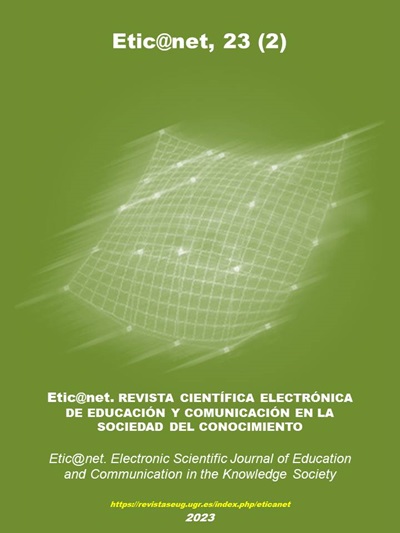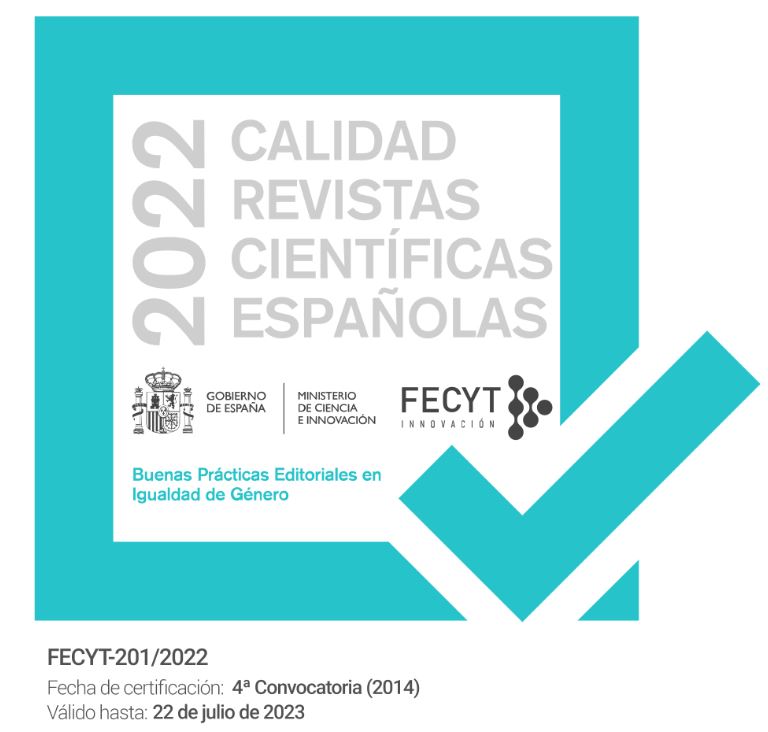Podcast Fridays: classroom Media Literacy case study
DOI:
https://doi.org/10.30827/eticanet.v23i2.27610Keywords:
media, radio, media literacy, podcast, communication, digital competenceAbstract
The radio inside the studies of the future communicators and informants of the mass media is something habitual; however, it is not so important to use it for purposes of media literacy among students, while developing their technical skills and self-expression needs. At this meeting point between these three pillars: media literacy, technical knowledge and self-expression of the students, the "Viernes de podcast" project is framed, where we as teachers are allowed to bring the radio communication medium closer to our students and turn it into a moment of reflection regarding the influence of the media, the social issues that affect their education, or the dangers and advantages of social networks. With a quantitative study through questionnaires worked by the students (n=150) and the teachers (n=20) participating in the project, it is concluded that, with the implementation of these workshops, not only has a greater understanding of by the students of media and educommunication concepts, but at the same time their level of socialization, ability to speak in front of a microphone and group pressure, empathy and teamwork have increased.
Downloads
References
De Vega Martín, A.L., Pinedo González, R., & Gutiérrez Martín, A. (2022). Alfabetización mediática e informacional en las Escuelas de Imagen y Sonido. Percepciones del profesorado y alumnado. EDMETIC, 11(2), art. 10. https://doi.org/10.21071/edmetic.v11i2.14978
De Vega Martín, A.L., (2022). Grandes retos del profesorado de formación profesional: la alfabetización mediática y audiovisual. En Tecnologías y metodologías para el aprendizaje por competencias, 311-318.
García-Galera, M.C., Martínez-Nicolás, M., & Del Hoyo-Hurtado, M. (2021). Innovation in journalism educational programmes at university. A systematic review of educational experiences at Spanish universities. Profesional de la información, 30(3), e300307. https://doi.org/10.3145/epi.2021.may.07
Gutiérrez-Martín, A., Pinedo-González, R., & Gil-Puente, C. (2022). ICT and Media competencies of teachers. Convergence towards an integrated MIL-ICT model. Comunicar, 70, 21-33. https://doi.org/10.3916/C70-2022-02
Hernández, R., Baptista, P., y Fernández, C. (2018) Metodología de la investigación. McGraw-Hill.
Hoechsmann, M. and Gutiérrez-Martín, A. (2020). Empowerment and Participation in Media Education: A Critical Review. In Steinberg, Shirley R. and Down, Barry (editors) (2020). The SAGE Handbook of Critical Pedagogies. pp. 1074-1083. SAGE Reference.
Ifedayo, A. E., Ziden, A. A., & Ismail, A. B. (2021). Podcast acceptance for pedagogy: the levels and significant influences. Heliyon, 7(3), e06442. https://doi.org/10.1016/j.heliyon.2021.e06442
Quintana, D. S., & Heathers, J. A. J. (2021). How Podcasts Can Benefit Scientific Communities. Trends in Cognitive Sciences, 25(1), 3–5. https://doi.org/10.1016/j.tics.2020.10.003
López-Vidales, N. y González-Aldea, P. (2014). Audioblogs and Tvblogs, tools for collaborative learning in journalism. [Audioblogs y Tvblogs, herramientas para el aprendizaje colaborativo en Periodismo]. Comunicar, 42, 45-53. https://doi.org/10.3916/C42-2014-04
Martín Martín, M. (2017). Aportaciones pedagógicas de las TIC a los estilos de aprendizaje. Tendencias Pedagógicas, 30, 91-104.
Muratova, N., Grizzle, A., & Mizakhemedova, D. (2021) Media and Information Literacy in Journalism: A Handbook for Journalists and Journalism Educators. UNESCO
Piñeiro-Otero, T. y Costa Sánchez, C. (2011). Potencialidades del podcast como herramienta educativa para la enseñanza universitaria. Revista científica electrónica de Educación y Comunicación en la Sociedad del Conocimiento, 11, 124-136. https://www.ugr.es/local.sevimeco/revistaeticanet/index.htm
Pérez, A., Marín, P., Delgado, A. & Romero, L. (2019). Media Competence in Spanish Secondary School Students. Assessing Instrumental and Critical Thinking Skills in Digital Contexts. Educational sciences: theory & practice, 19(3), 33-48. https://doi.org/10.12738/estp.2019.3.003
Ramírez-García, A., & González-Fernández, N. (2016). Media competence of teachers and students of compulsory education in Spain. Comunicar, 49, 49-58. https://doi.org/10.3916/C49-2016-05
Read, T. & Bárcena, E. (2015). Toward mobile assisted Language MOOCs. En A. Mesquita & Paula Peres (Ed.) Furthering Higher Education Possibilities through Massive Open Online Courses, Nueva York: IGI Global: 225-244.
Trujillo Sáez, F., Segura Robles, A., & González Vázquez, A. (2020). Claves de la innovación educativa en España desde la perspectiva de los centros innovadores: una investigación cualitativa. Participación Educativa. Revista Del Consejo Escolar Del Estado, 7(10), 35–47. https://sede.educacion.gob.es/publiventa/descarga.action?f_codigo_agc=21127
Salaverría, R., & León, B. (2022). Misinformation beyond the media: ‘Fake News’ in the big data ecosystem. In Total Journalism (pp. 109-121). Springer. https://doi.org/10.1007/978-3-030-88028-6_9
Salmon, G. y Nie, M. (2008). Doubling the life of iPods en Salmon, G. y Palitha, E. Podcasting for learning in universities (Reino Unido, McGrawhill).
Santiago, R. y Bárcena, E. (2016). El potencial del podcast como recurso didáctico para el desarrollo de las destrezas orales de segundas lenguas con dispositivos móviles. Porta Linguarum: revista internacional de didáctica de las lenguas extranjeras, Extra 1, 61-72. https://doi.10.30827/Digibug.54089
UNESCO (Ed.) (2019). Marco de competencias de los docentes en materia de TIC. Versión 3.0. Unesco. https://bit.ly/396mlqO
Veiga Marriott, R. & Lupion Torres, P. (2009). Handbook of Research on eLearning Methodologies for Language Acquisition. Information Science Reference, Nueva York: IGI Global.
Yevtushenko, O., & Kovalova, T. (2019). Media education for future media professionals: designing and implementing a training programme. Advanced Education, 12, 94-104. https://doi.org/10.20535/2410-8286.128668
Downloads
Published
Issue
Section
License
The authors who publish in this journal agree to the following terms: The authors retain the copyright and grant the journal the right to be the first publication of the work as well as licensed under a Creative Commons Attribution License that allows others to share the work with an acknowledgment of the authorship of the work and the initial publication in this magazine. Authors are allowed and encouraged to disseminate their work electronically (for example, in institutional repositories or on their own website) before and during the submission process, as it may lead to productive exchanges as well as further citation. Earliest and greatest of published works (See The Effect of Open Access).













